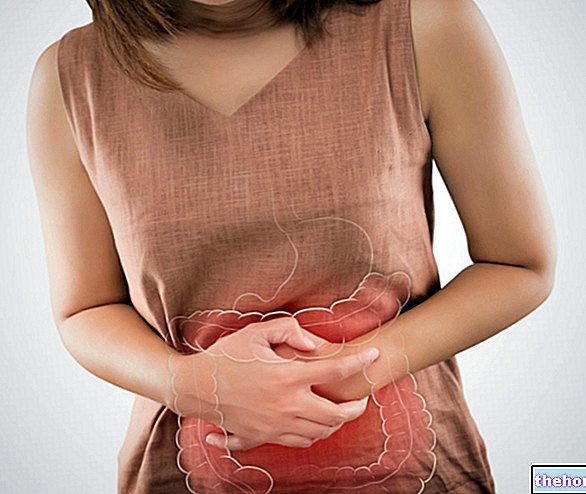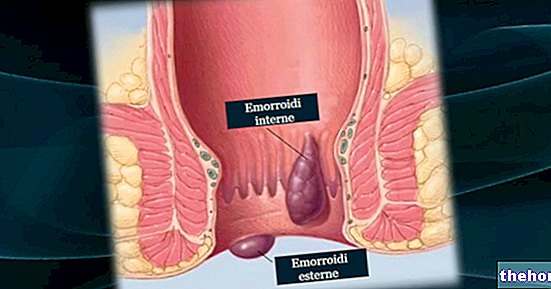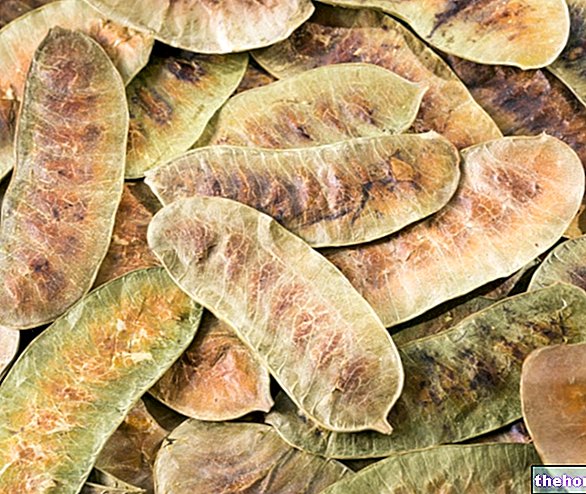" Crohn's disease
Fistulas
If Crohn's disease progresses, there may be other disorders related to the frequent anal localization, which often involves the onset of fistulas.
In the most serious cases, the fistulization of the intestinal wall can cause bleeding, with the presence of occult blood in the faeces and more rarely with bleeding of a certain entity.

In the most severe forms, which represent the minority, patients with Crohn's disease have a "significant impairment of general conditions, due to global malabsorption - especially of numerous vitamins - which can lead to significant weight loss.
Diagnosis
If the disease is severe and long-lasting, anemia develops, which may have the characteristics of both chronic disease anemia and, more rarely, iron deficiency anemia (iron deficiency) due to the continuous loss of small amounts of blood, and vitamin B12 deficiency anemia (megaloblastic).
The radiographs of the digestive system are made with a contrast medium (to better highlight the sections affected by the lesions) and show a characteristic "cobblestone" appearance of the terminal ileum, due to its occlusions and its irregularity (appearance); at times the tract affected by Crohn's disease appears occluded to the point of being threadlike (sign of the cord), while the tract immediately upstream may be dilated (the association of filiform tract, cobbled area and dilated loop constitutes a triad not frequent but, when present, confirms the disease). It is also possible, due to the marked irregularities present, that the contrast medium even skips the terminal tract of the ileum of which, therefore, the radiological image is missing (sign of the " jump ") and therefore a totally black area appears.
The most precise diagnosis is the histological one (under the microscope), by means of biopsy (removal of a piece) of the intestinal mucosa. It is also very important to differentiate Crohn's disease from ulcerative colitis and appendicitis.
Complications
They can be local and systemic (general).
Among the local, the most frequent are: intestinal occlusion and / or perforation; fistulas (between two intestinal loops, between a loop and the skin, or the bladder, or the vagina); malabsorption; tumors (their incidence is greater than in the general population, although lower than that of patients with ulcerative colitis) .
Among the systemic, we find: loss of weight and muscle mass; growth retardation in the child; alterations in electrolytes (reduction of calcium, magnesium, potassium); drop in albumin; anemia; steatorrhea (which is associated with malabsorption of lipids and vitamins); erythema nodosum (skin lesions that appear as reddened, moderately painful nodules, mainly located in the legs); pyoderma gangrenous (another skin manifestation that occurs presents with vesicles in the lower limbs, which then become pustules, whose rupture determines the appearance of ulcers that can become infected); arthritis (often migrating, affecting mainly the ankles, knees, hips, wrists, but also any other joint, with pain and swelling); conjunctivitis and keratitis; liver lesions of various types (steatosis, hepatitis, etc.); venous thrombosis (due to increased blood coagulability and / or dehydration).
Course
Crohn's disease is chronic, so there is never a complete cure; generally, more or less protracted periods of remission alternate with phases of exacerbation. The prognosis of Crohn's disease is less favorable than that of ulcerative colitis. Overall, mortality increases with the duration of the disease and is globally around 5-10% of cases (the most frequent causes of death are peritonitis and generalized infections).
Therapy
It can be medical (with drugs) or surgical, if the medical one has not been successful.
Medicines
The core drugs are represented by a derivative of aspirin called salazopyrine, which is responsible for the anti-inflammatory action. The main side effects they can cause are: gastritis, liver and kidney problems, anemia, male infertility (due to a reduction in the number and motility of spermatozoa, but reversible within 3 months of suspension of treatment ).
In moderate and / or severe forms, cortisone derivatives should be used (prednisone) and, in patients who do not respond to these two therapies, drugs that suppress the immune system should be used (azathioprine, 6-mercaptopurine, cyclosporine A, methotrexate). Recently some drugs have also been used in therapy that stop the action of some molecules involved in inflammatory processes (Infliximab).
For further information: Medicines for the treatment of Crohn's disease
Surgery
In forms of Crohn's disease that do not benefit from medical treatment alone, surgery is recommended, especially in the presence of complications (stenosis, fistulas, perforation and abscesses).
For further information: Colectomy - Ileostomy
Diet
Finally, it is important to remember the importance in Crohn's disease (especially in the acute phases) of the diet, which must be light, low in waste and without milk; moreover, since these patients are frequently malnourished, it must be high-calorie and with the addition of vitamins and mineral salts. The consumption of fatty meats and irritating foods (pepper, chilli, tea, coffee) will be limited, preferring sober cooking methods at low and prolonged heat (to reduce the bacterial load, especially in the case of fish and meat) and avoiding violent ones (frying, grilling ...).
It is also important to reduce the consumption of refined carbohydrates and foods rich in artificial colors (some micro- and nano-particles used as additives, for example titanium dioxide, seem to indirectly exacerbate the inflammatory response in the intestine).
The diet for Chron's disease must therefore include products as healthy as possible, natural and organic (meat from grazing animals, free of antibiotics or drug residues), without added artificial additives and capable of carrying out an "anti-inflammatory action. systemic level (useful in this sense are vegetable oils rich in omega three, sea fish and some vegetable juices).
To learn more, read: Diet for Crohn's disease "
Other articles on "Crohn's Disease: Cure"
- Crohn's disease
- Crohn's disease medications
- Crohn's disease - Herbal medicine




























